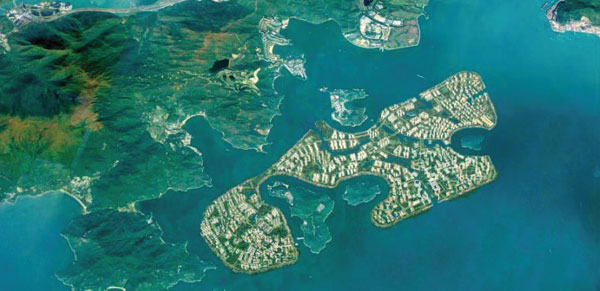Land reclamation the 'right panacea' for HK's housing woes
Updated: 2019-01-14 07:54
By Luo Weiteng and Oswald Chan in Hong Kong(HK Edition)
|
|||||||||
Having earned itself the dubious honor of being crowned the world's least affordable place to live in, Hong Kong is desperately looking for more space to house its future population.
In a sign of her determination to plug the acute shortage of land supply and tackle the years-long housing crunch, Chief Executive Carrie Lam Cheng Yuet-ngor introduced an ambitious reclamation project that was the cornerstone of her second Policy Address in October last year.
Dubbed "Lantau Tomorrow Vision", the project, embracing gigantic man-made islands, estimated to cover 1,700 hectares to the east and north of Lantau Island and off the Tuen Mun coast, would be home to 1.1 million people and Hong Kong's third housing and business center in the making.

"In the long run, reclamation is Hong Kong's best answer and the most viable solution to the acute land supply problem, which has long been cited as the culprit in Hong Kong's housing conundrum," said veteran surveyor Vincent Cheung Kiu-cho.
While using land from unused New Territories land and brownfield sites appears to be another feasible option, Cheung believed the mounting legal challenges could make its potential costs and timetable almost impossible to predict.
"As the SAR government races against time to offer a beacon of hope for ordinary citizens of owning a roof over their heads, we cannot afford to wait any longer," he said. "A plan you have no idea about how much it may cost and how long it will take simply doesn't work."
If everything goes smoothly, the new homes would be available by 2032. According to government projections, the project would cost between HK$400 billion and HK$500 billion.
"Making a better housing environment for the next generation is never an issue that could be done once and for all," said Cheung. "Such an issue should squarely focus on ramping up land supply in a more sustainable manner from a longer-term perspective."
The planned 1,700-hectare man-made islands would enable Hong Kong to lay its hands on a large amount of new land, he reckoned.
Compared with brownfield sites and agricultural land in the New Territories held by major developers and inhabitants, the artificial lands, with predictable costs, construction time and sole ownership, will allow us to plan from scratch and lose no time in making a move, Cheung said.
"Reclamation does not rule out the possibility of releasing the development potential of some 1,300 hectares of brownfield sites and 1,000 hectares of agricultural land in the New Territories. Both proposals can definitely work in tandem," he said.
"As the reclamation project finally gets off the ground, hopefully, private owners of brownfield sites and agricultural land, who may worry about a cooling housing market in the foreseeable future, will join the fray in developing their lands in a more proactive and open manner. This will fundamentally increase the supply of developable land in such a space-starved city," Cheung noted.
With current stocks of 2.7 million residential units in Hong Kong, the proposed Lantau reclamation, which will offer an estimated 260,000 to 400,000 new homes, could boost long-term residential unit supply by 10 to 15 percent, reckoned Marcos Chan Kam-ping, head of Hong Kong, Macao and Taiwan Research at CBRE - a global real-estate advisory firm.
"Although the short to mid-term housing unit forecast brought by the proposed reclamation project may vary, its long-term effect on enhancing residential land supply is clear," Chan added.
Another factor that needs to be considered is that, after 20 to 30 years, existing dominant housing estates like Mei Foo Sun Chuen, Taikoo Shing, Whampoa Garden, Laguna City, City One Shatin and others will be made obsolete if there is no further replenishment of new housing units, and the supply of residential flats by that time may dwindle, Chan warned.
"The proposed 400,000 new homes are the bare minimum level that the government should do in enhancing residential unit supply," Chan told China Daily.
Terence Chong Tai-leung, associate professor at The Chinese University of Hong Kong's Lau Chor Tak Institute of Global Economics and Finance, said the proposed reclamation scheme should benefit the city's long-term development.
"Not only residential units will be built on those artificial islands, there'll be hospitals and commercial buildings," Chong told China Daily. "Moreover, if the artificial islands east of Lantau could provide transportation links between Tuen Mun and Hong Kong Island's western region, it could bring more benefits to the community."
Chong believed the Hong Kong government should have the financial capability to support such an ambitious land reclamation plan as it has a structural budget surplus.
"The equity and property markets offer more stamp duty revenues for the government than it anticipates," said Chong.
The government announced a budget surplus of HK$138 billion for the 2017-18 financial year last February. Chong argued that, theoretically, budget surpluses of three to four financial years could be used to cover the estimated total cost of the Lantau reclamation project, so the administration should have the financial resources to push forward the project.
Contact the writers at sophia@chinadailyhk.com
(HK Edition 01/14/2019 page6)